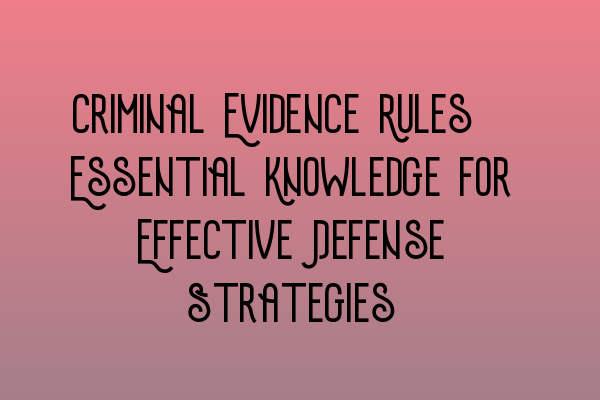Criminal Evidence Rules: Essential Knowledge for Effective Defense Strategies
As a criminal defense solicitor, understanding the criminal evidence rules is crucial for building effective defense strategies. The rules surrounding the admissibility and presentation of evidence in criminal proceedings play a critical role in shaping the outcome of a case.
The Importance of Criminal Evidence Rules
Criminal evidence rules serve to maintain fairness, justice, and the integrity of the legal system. They establish the parameters for what evidence can be presented in court and how it should be evaluated. Adhering to these rules ensures that both the prosecution and defense have a fair chance to present their case and that the truth can be established based on reliable evidence.
Having a comprehensive understanding of the criminal evidence rules allows defense solicitors to challenge the admissibility and reliability of the evidence presented by the prosecution. This knowledge enables them to protect their clients’ rights and build strong defense strategies.
Key Criminal Evidence Rules
1. Relevance: Evidence must be relevant to the issues in question. It should have a logical connection to the facts of the case and assist the court in reaching a fair decision.
2. Hearsay: Hearsay evidence, which is an out-of-court statement offered for the truth of the matter asserted, is generally inadmissible. However, there are exceptions to this rule, such as dying declarations or statements made against interest.
3. Opinion: Witness opinions are generally not admissible unless the witness is qualified as an expert in a particular field. Lay opinions, unless based on personal perception, are usually excluded.
4. Character: Evidence of a person’s character or disposition is generally inadmissible to prove their behavior in a specific instance. However, it may be admissible if character is directly relevant to the case or if it is an issue in a defamation or sexual misconduct case.
5. Privilege: Certain communications, such as those between solicitor and client or doctor and patient, are protected by privilege and cannot be used as evidence without the consent of the privileged party.
These are just a few examples of the criminal evidence rules that defense solicitors must be familiar with. By understanding these rules and their exceptions, solicitors can identify potential weaknesses in the prosecution’s case and develop effective cross-examination strategies.
How Criminal Evidence Rules Impact Defense Strategies
The knowledge of criminal evidence rules allows defense solicitors to:
- Identify inadmissible evidence and request its exclusion from proceedings.
- Challenge the credibility of witnesses through cross-examination.
- Present alternative theories of the case based on the inconsistencies or gaps in the evidence.
- Secure expert witnesses to counter the prosecution’s evidence or provide alternative explanations.
Effective defense strategies leverage the criminal evidence rules to create doubt, raise reasonable alternative explanations, and expose any weaknesses in the prosecution’s case.
For example, in a case where hearsay evidence is being used against the defendant, a defense solicitor can argue for its exclusion by highlighting its lack of reliability or the absence of a recognized exception to the hearsay rule.
Moreover, understanding the criminal evidence rules allows solicitors to plan their case presentations strategically. By presenting evidence in a clear and organized manner, they can enhance its impact and credibility.
Conclusion
Criminal evidence rules are the foundation of effective defense strategies. By thoroughly understanding and applying these rules, defense solicitors can identify weaknesses in the prosecution’s evidence, challenge its admissibility, and build compelling arguments that protect their clients’ rights.
To enhance your knowledge of criminal law and practice in the UK, consider exploring the following related articles:
Continue your legal education, stay updated with the latest regulations, and strengthen your defense strategies by immersing yourself in the wealth of resources offered by SQE Criminal Law & Practice Law UK.
